牛津译林版七年级下册Unit 8 Pets(Grammar)课件(共15张PPT)
文档属性
| 名称 | 牛津译林版七年级下册Unit 8 Pets(Grammar)课件(共15张PPT) | 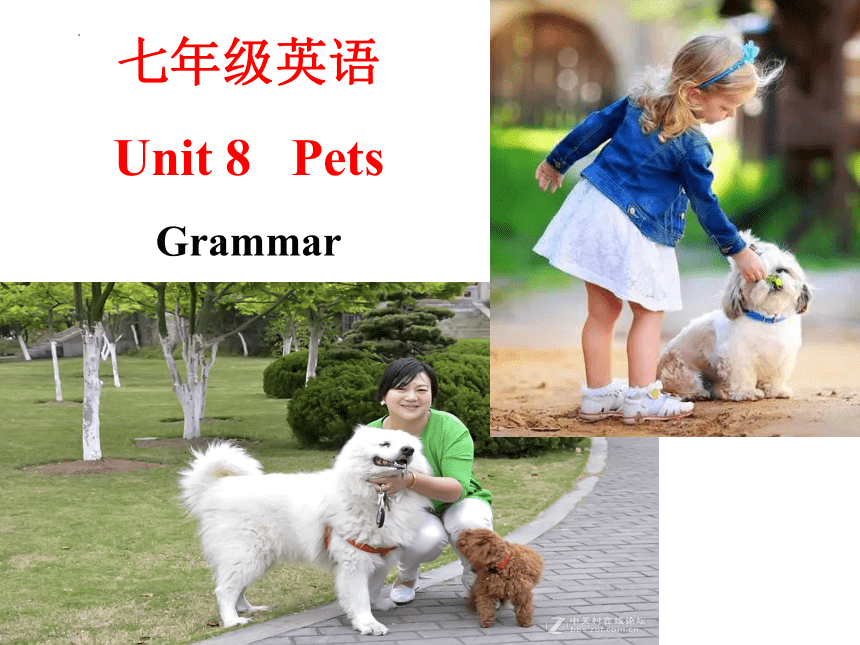 | |
| 格式 | pptx | ||
| 文件大小 | 1.8MB | ||
| 资源类型 | 教案 | ||
| 版本资源 | 牛津译林版 | ||
| 科目 | 英语 | ||
| 更新时间 | 2023-06-05 16:29:36 | ||
图片预览

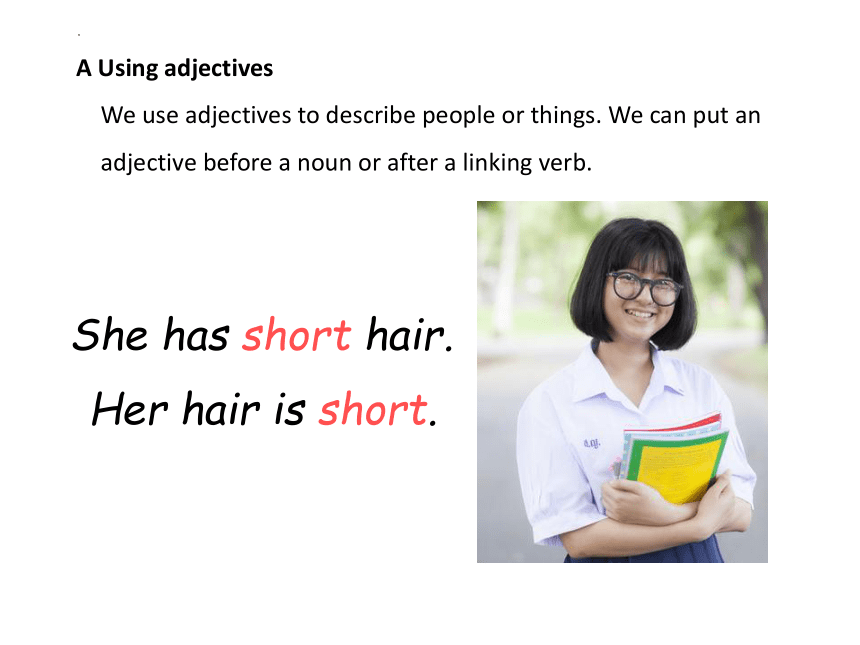
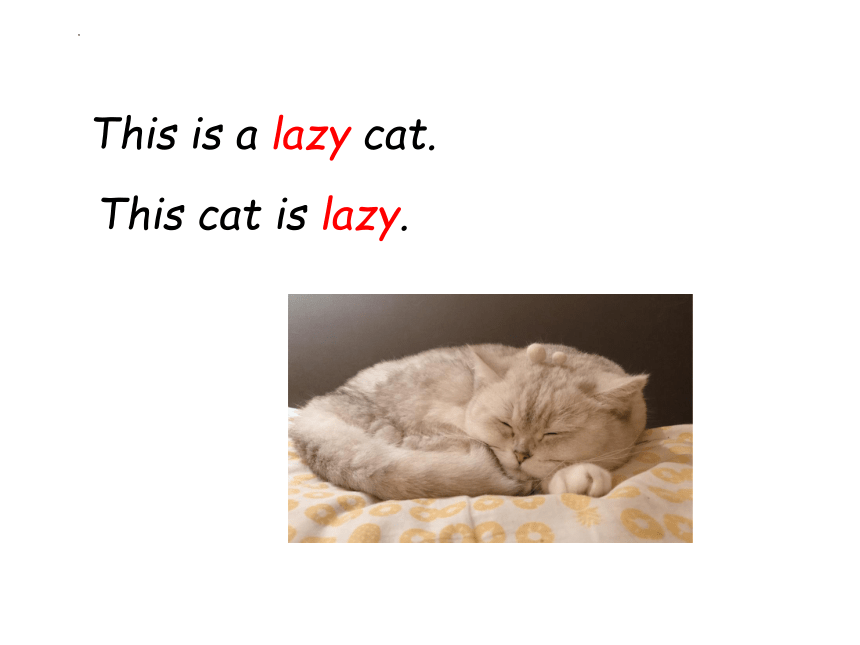
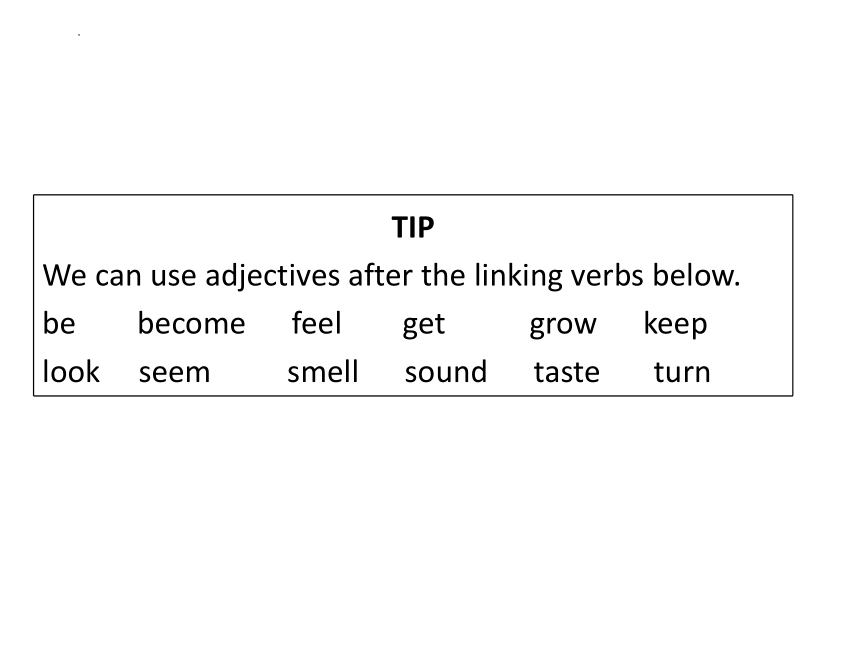
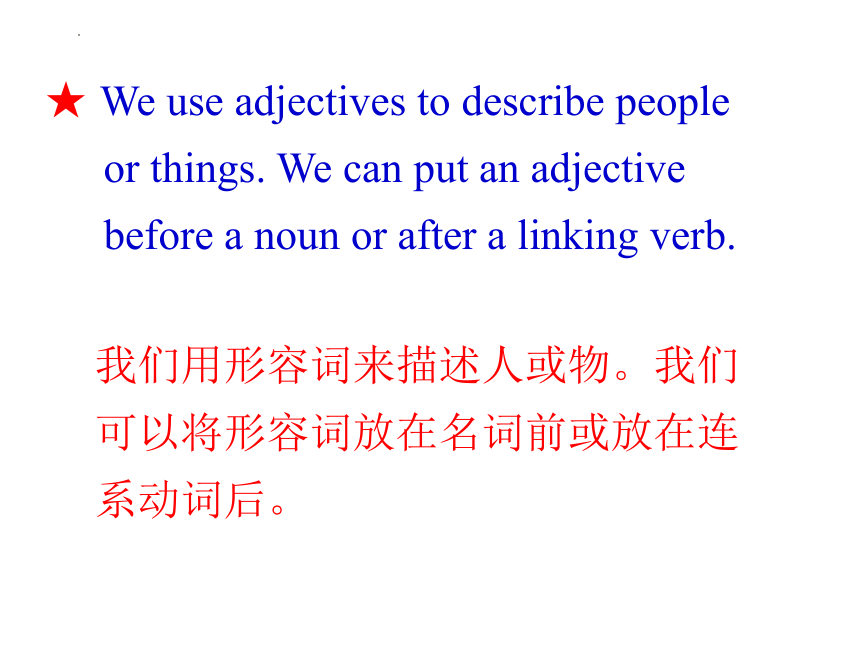

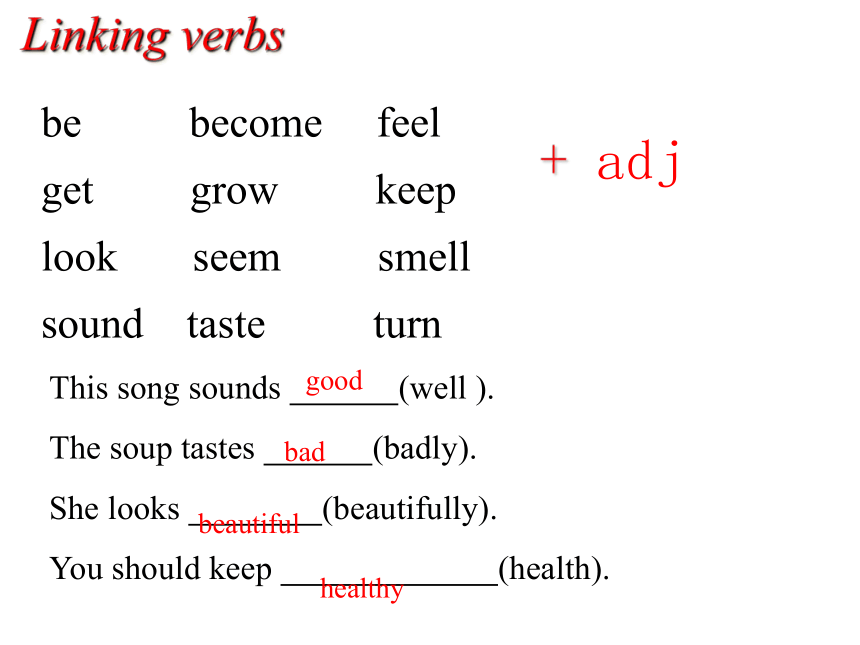
文档简介
(共15张PPT)
七年级英语
Unit 8 Pets
Grammar
A Using adjectives
We use adjectives to describe people or things. We can put an adjective before a noun or after a linking verb.
She has short hair.
Her hair is short.
This is a lazy cat.
This cat is lazy.
TIP
We can use adjectives after the linking verbs below.
be become feel get grow keep
look seem smell sound taste turn
我们用形容词来描述人或物。我们可以将形容词放在名词前或放在连系动词后。
★ We use adjectives to describe people or things. We can put an adjective before a noun or after a linking verb.
About pets
Daniel is making some notes about pets. Help him make sentences with the words below.
1 make/Birds/sounds/nice __________________________________
2 are/clever/Dogs/and/friendly ______________________________
3 and/quiet/Goldfish/look after/to/are/easy
______________________________________________________
Birds make nice sounds.
Dogs are clever and friendly.
Goldfish are quiet and easy to look after.
Linking verbs
be become feel
get grow keep
look seem smell
sound taste turn
+ adj
This song sounds (well ).
The soup tastes (badly).
She looks (beautifully).
You should keep (health).
bad
good
beautiful
healthy
形容词在句中的位置:
形容词作定语通常置于被修饰词之前,但当被修饰的词是复合不定代词时,则置于复合不定代词之后。
如: something interesting
形容词作表语位于系动词之后。除be动词外,系动词还包括become、feel、get、look、seem、smell、sound、taste、turn等,这些词后常接形容词作表语。
如:The price sounds reasonable.
这个价格听起来算是合理的。
Daniel found two passages about pets on the plete the sentences with the words in the box.
I have a (1) _________ cat. She likes to run after balls. When she gets (2) _________, she sleeps anywhere. She miaows when she is (3) __________.
black clever happy hungry special tired
black
tired
hungry
指人:
somebody、someone 某人
anybody、anyone 某人
everybody、everyone 每个人
nobody、no one 没有人
指物:
something 某物
anything 某物
everything 每件事,一切
nothing 没事
Indefinite pronouns
somebody, something, someone
常用于肯定句中;疑问句中,如果希望得到对方肯定的回答,也会用some-。
如:Hey, Lily. There is someone outside the door. 嗨,丽丽,门外有人。
anything, anybody, anyone
常用于疑问句或否定句中。
如:Did you meet anyone when you came to school last Sunday
上个星期天你来学校时见到什么人了吗
no one, nobody, nothing
no-有否定含义,no one表示“没有人”,nobody = not anyone, nothing = not anything
如:He has nothing much to do today.
他今天没有多少事情做。
everybody, everyone, everything
everybody/everyone的意思是“每个人,人人”,everything的意思是“每件事,一切”。
如:Everybody likes swimming.
每个人都喜欢游泳。
Keeping a pet at home
Mr Wu is asking the students about their plete their conversation with the correct indefinite pronouns.
Mr Wu: Millie, I know you have a dog. What do you feed him
Millie: We usually give him dog food.
Mr Wu: Do you feed him (1) _________ else
Millie: Yes. Sometimes we give him some meat. He likes it.
anything
Mr Wu: I see. Does (2) _________ have a cat
Amy: Yes, I have a cat. She’s nice to (3) _____________.
Mr Wu: Good. I know (4) ___________ has goldfish, right
Peter: Yes, I do. Goldfish are easy to look after.
Mr Wu: That’s true. Does (5) _________ have a snake
Kitty: No. (6) ___________________ wants a snake, I think.
Daniel: I don’t agree. ② There’s (7) _________ wrong with keeping a snake if you like it.
anyone
everyone
someone
anyone
Nobody/No one
nothing
七年级英语
Unit 8 Pets
Grammar
A Using adjectives
We use adjectives to describe people or things. We can put an adjective before a noun or after a linking verb.
She has short hair.
Her hair is short.
This is a lazy cat.
This cat is lazy.
TIP
We can use adjectives after the linking verbs below.
be become feel get grow keep
look seem smell sound taste turn
我们用形容词来描述人或物。我们可以将形容词放在名词前或放在连系动词后。
★ We use adjectives to describe people or things. We can put an adjective before a noun or after a linking verb.
About pets
Daniel is making some notes about pets. Help him make sentences with the words below.
1 make/Birds/sounds/nice __________________________________
2 are/clever/Dogs/and/friendly ______________________________
3 and/quiet/Goldfish/look after/to/are/easy
______________________________________________________
Birds make nice sounds.
Dogs are clever and friendly.
Goldfish are quiet and easy to look after.
Linking verbs
be become feel
get grow keep
look seem smell
sound taste turn
+ adj
This song sounds (well ).
The soup tastes (badly).
She looks (beautifully).
You should keep (health).
bad
good
beautiful
healthy
形容词在句中的位置:
形容词作定语通常置于被修饰词之前,但当被修饰的词是复合不定代词时,则置于复合不定代词之后。
如: something interesting
形容词作表语位于系动词之后。除be动词外,系动词还包括become、feel、get、look、seem、smell、sound、taste、turn等,这些词后常接形容词作表语。
如:The price sounds reasonable.
这个价格听起来算是合理的。
Daniel found two passages about pets on the plete the sentences with the words in the box.
I have a (1) _________ cat. She likes to run after balls. When she gets (2) _________, she sleeps anywhere. She miaows when she is (3) __________.
black clever happy hungry special tired
black
tired
hungry
指人:
somebody、someone 某人
anybody、anyone 某人
everybody、everyone 每个人
nobody、no one 没有人
指物:
something 某物
anything 某物
everything 每件事,一切
nothing 没事
Indefinite pronouns
somebody, something, someone
常用于肯定句中;疑问句中,如果希望得到对方肯定的回答,也会用some-。
如:Hey, Lily. There is someone outside the door. 嗨,丽丽,门外有人。
anything, anybody, anyone
常用于疑问句或否定句中。
如:Did you meet anyone when you came to school last Sunday
上个星期天你来学校时见到什么人了吗
no one, nobody, nothing
no-有否定含义,no one表示“没有人”,nobody = not anyone, nothing = not anything
如:He has nothing much to do today.
他今天没有多少事情做。
everybody, everyone, everything
everybody/everyone的意思是“每个人,人人”,everything的意思是“每件事,一切”。
如:Everybody likes swimming.
每个人都喜欢游泳。
Keeping a pet at home
Mr Wu is asking the students about their plete their conversation with the correct indefinite pronouns.
Mr Wu: Millie, I know you have a dog. What do you feed him
Millie: We usually give him dog food.
Mr Wu: Do you feed him (1) _________ else
Millie: Yes. Sometimes we give him some meat. He likes it.
anything
Mr Wu: I see. Does (2) _________ have a cat
Amy: Yes, I have a cat. She’s nice to (3) _____________.
Mr Wu: Good. I know (4) ___________ has goldfish, right
Peter: Yes, I do. Goldfish are easy to look after.
Mr Wu: That’s true. Does (5) _________ have a snake
Kitty: No. (6) ___________________ wants a snake, I think.
Daniel: I don’t agree. ② There’s (7) _________ wrong with keeping a snake if you like it.
anyone
everyone
someone
anyone
Nobody/No one
nothing
